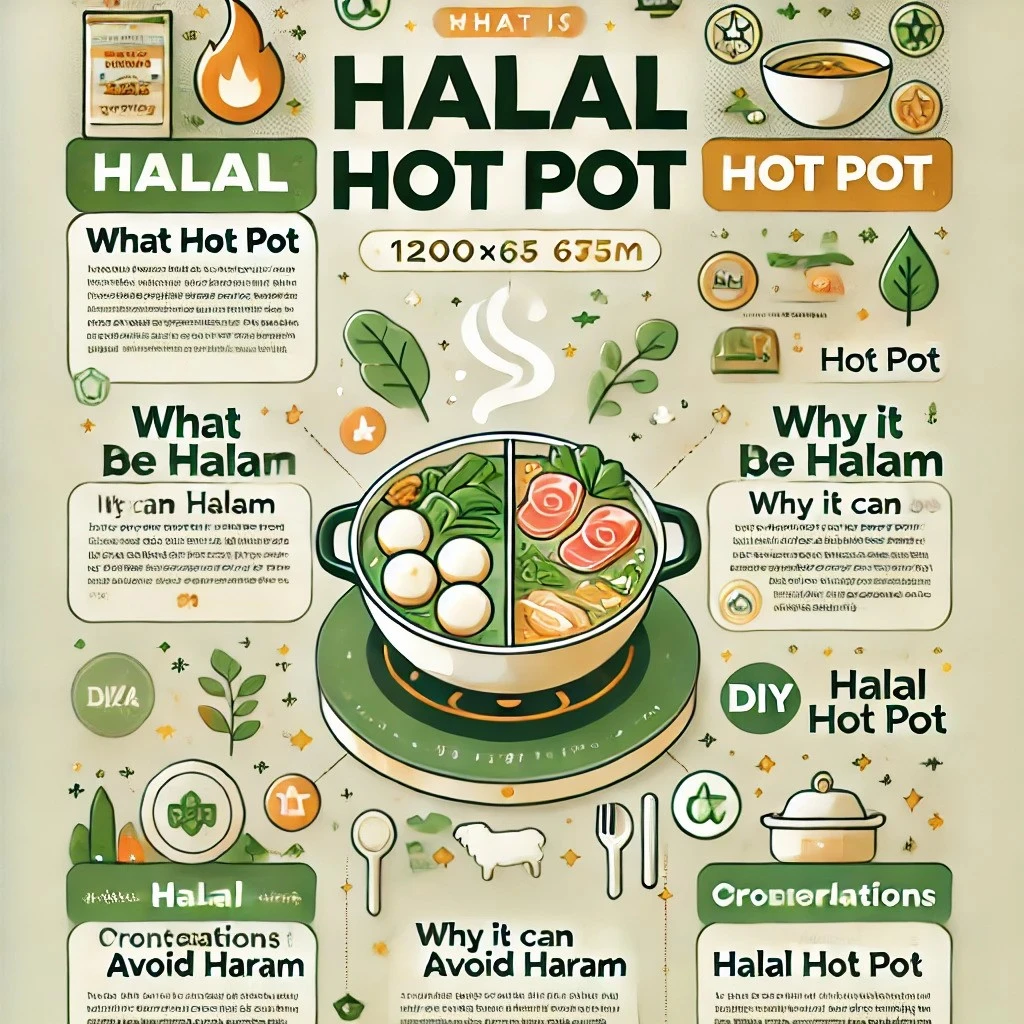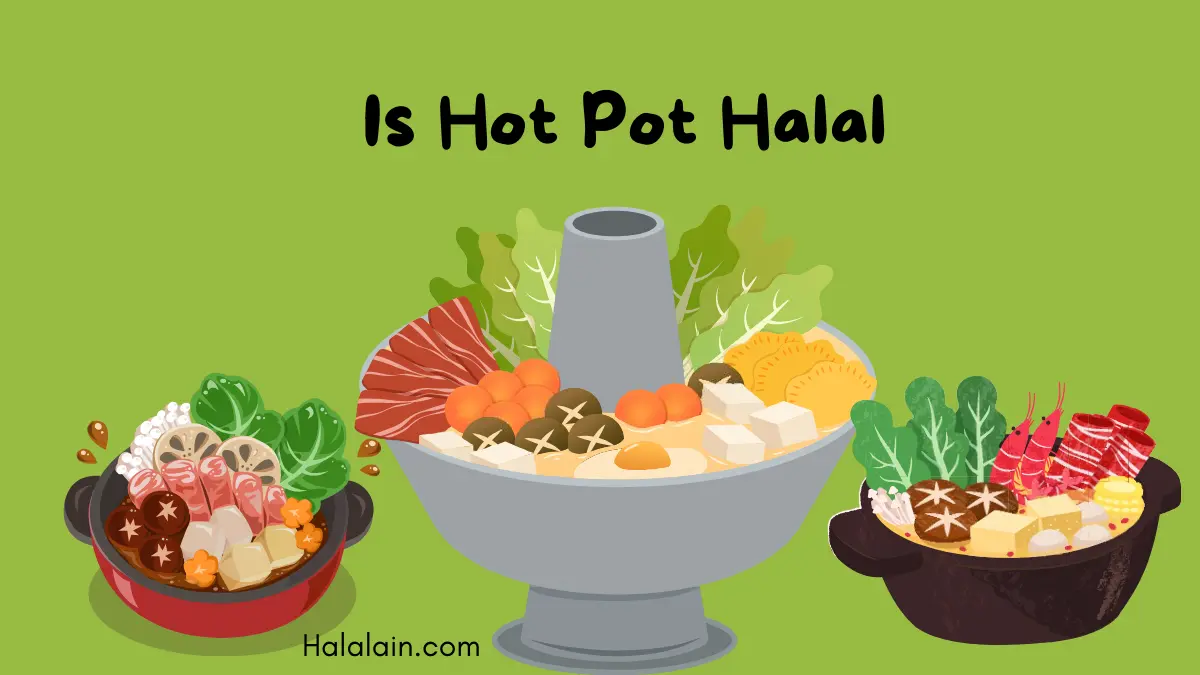Discover the world of hot pot and its halal variations. Learn about hot pot in Islam, its ingredients, DIY tips, and find hot pot options in restaurants. Uncover the answers and embark on a halal hot pot culinary journey.
Welcome to the Tantalizing World of Halal Hot Pot!
Hot pot is more than just food; it’s an experience that brings people together over a simmering pot of deliciousness. Let’s explore how this communal dining tradition can align with Islamic dietary principles, ensuring a flavorful yet halal culinary adventure.
What is a Hot Pot?
Hot pot is a communal dining experience that originated in East Asia, where raw ingredients like meat, vegetables, seafood, and noodles are cooked in a simmering broth at the table. It fosters togetherness and allows everyone to enjoy a personalized and interactive feast. Each culture adds its unique spin to hot pot, making it a truly diverse culinary experience.
Is Hot Pot Halal?
Yes, hot pot can be halal if it adheres to Islamic dietary laws. To ensure it’s halal, careful attention must be paid to:
- Meat: Using halal-certified meat.
- Broth: Ensuring the broth is free of any haram (forbidden) ingredients.
- Additives: Avoiding alcohol or other haram substances.
- Preparation: Preventing cross-contamination with non-halal items.
Let’s delve deeper into the specifics.

Read More:
Key Considerations for a Halal Hot Pot
1. Meat Selection
Halal hot pot depends heavily on the type of meat used. Always choose halal-certified meats, whether it’s tender chicken, juicy beef, or succulent lamb. Ensure that the meat has been slaughtered following Islamic guidelines.
2. Broth Beneath the Surface
The broth is the heart of a hot pot. Choose a base free from any prohibited substances. Vegetarian or seafood-based broths are often safer options for a halal-friendly experience.
3. Navigating Seafood Selections
Seafood enthusiasts rejoice! Most seafood is considered halal in Islam. However, ensure that no haram additives or cross-contamination occurs during preparation.
4. Avoiding Haram Additives
Watch out for sauces or broths that might contain alcohol, pork derivatives, or other non-halal elements. Opt for halal-certified or vegetarian-friendly alternatives.
DIY Halal Hot Pot at Home
Craving a homemade hot pot? Follow these steps to ensure your feast aligns with halal principles:
- Choose Halal Ingredients: Start with halal-certified meats and fresh vegetables.
- Prepare a Halal Broth: Use a clear, vegetarian broth or halal-certified bone broth as the base.
- Avoid Cross-Contamination: Keep halal and non-halal ingredients separate during preparation.
- Customize Your Feast: Add noodles, tofu, and halal-certified sauces to create a delightful variety.
- Cook with Care: Ensure utensils and cooking surfaces are clean and free from non-halal residue.
Why Hot Pot, Not Haram? 5 Reasons
- Meat Selection: Halal-certified meats ensure compliance with Islamic dietary laws.
- Customizable Broth: You control the content, making it easier to align with halal principles.
- Seafood Inclusion: Most seafood is halal, adding a delicious and permissible option.
- Personalized Cooking: Individuals cook their own food, allowing for transparency in ingredient choices.
- Culinary Awareness: The experience encourages mindfulness about food choices, promoting halal-conscious dining.
Potential Haram Concerns in Hot Pot
- Non-Halal Meat Usage: Using non-halal meat renders the entire dish haram.
- Prohibited Broth Ingredients: Broths may contain alcohol or pork derivatives.
- Cross-Contamination: Shared cooking spaces can mix halal and non-halal ingredients.
- Alcohol or Haram Additives: Some recipes might include alcoholic beverages or haram sauces.
- Lack of Transparency: Ambiguity about ingredient sourcing can make the dish impermissible.
FAQs
Is Hot Pot generally considered halal?
Hot pot can be halal if the ingredients comply with Islamic dietary laws. It depends on the meats, broths, and sauces used.
What should I look for to ensure the meat is not haram in hot pot?
Check for halal certifications and confirm that the restaurant segregates halal and non-halal items.
Can I trust seafood in hot pot to always be Islamic?
Seafood is generally halal, but cross-contamination can occur. Verify the restaurant’s practices.
What about the broth and sauces? Ensure they don’t contain haram elements. Vegetarian or seafood-based broths are safer choices.
Can I host a halal hot pot gathering at home?
Absolutely! Choose halal-certified ingredients and prepare with care for a delicious and compliant meal.
Pro Tips for Dining Out
- Research: Look for restaurants with halal certifications.
- Ask Questions: Inquire about ingredient sourcing and cooking practices.
- Seek Reviews: Check recommendations from the local Muslim community.
Enhancing the Experience
- Incorporate Cultural Elements: Learn about the origins of hot pot and its significance in different cultures.
- Interactive Activities: Share your favorite hot pot recipes or restaurant recommendations in the comments.
- Visual Appeal: Include photos or infographics to make the post more engaging.
Final Thoughts
Hot pot is a delightful way to enjoy communal dining while adhering to Islamic dietary laws. Whether dining out or cooking at home, a halal hot pot experience is both satisfying and spiritually fulfilling. Embrace the diversity, customize your ingredients, and enjoy a flavorful journey into the world of halal hot pots!

